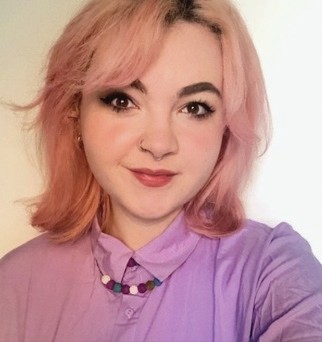TECH-NOLOGY
TECH FOR TECHS
Artificial intelligence & social media
REBECCA HITCHON gets the scoop on high-tech launches, decodes hot topics & sources tech-savvy tips for your business
In May, Meta – the parent company of Facebook, Instagram and Threads – added the option to label artificial intelligence-generated content on its platforms. I remember first seeing the ‘Made with AI’ tag on social media, and it raised the question: how much content have we been shown that is AI-generated, without our knowledge?
Since then, I haven’t noticed many AI labels on my feeds. Brand authenticity is highly valued in the social media space, and synthetic content poses the risk of alienating and misinforming audiences. However, artificial intelligence still has a significant role to play in social media marketing. Let’s explore...

Avril Kealy
Data insight
Artificial intelligence can help businesses to obtain information on social media performance. “AI is a great resource for professionals who want to delve deeper into their business’ data,” explains Avril Kealy, digital content strategist at salon software company, Phorest. “It can identify patterns and trends, which can be used to generate actionable insights.” A report released this year by Dash Hudson, a social media management platform, titled: AI and Creators: Shaping the Next Era of Social Marketing, noted that ‘more teams are beginning to leverage AI to glean insights into audience behaviours and preferences, to fuel smarter decision-making and ensure content performs at its highest level.’
So, how are they doing this? By harnessing analytic and predictive AI tools to quickly, easily and cheaply gain insight into audience preferences. Gone are the days of focus groups: AI knows what social media users want and how content will perform. Dash Hudson studied the social media performances of various brands using automation tool, Vision AI, to plan Instagram content between 2023 and 2024. It found that top-predicted content achieved higher engagement, effectiveness, video views and reach.

Richard McCabe
Personalised communications
Dash Hudson’s report revealed that artificial intelligence is helping businesses to connect with their social media audiences on a deeper level. Thanks to the insight that AI can provide on customer behaviours and preferences, social media messaging can be highly personalised and targeted, in turn increasing engagement. Think tailored product and service recommendations and targeted advertisements.
AI tools that can assist with personalised messaging are chatbots and virtual assistants, as Richard McCabe of Lifestyle Salon Coach tells Scratch. “AI can track what customers say about and to your business on social media, and help you respond quickly and in your brand voice, strengthening your reputation,” he comments. “AI social media chatbots can talk with clients at any time of the day, answering specific questions about your services and policies. This means clients are satisfied and engaged, while you gain time to focus on your work or personal life.”
Tool talk
YouTube creators can source ideas for videos that their viewers are likely to engage with via the platform’s ‘Inspiration’ tab, under ‘Analytics’ in YouTube Studio. Here, they can type topics into a search bar and receive AI-generated video ideas based on what is popular with their audience. Users can also share which suggestions they are not interested in to receive a refined selection. Check out what happened when I searched for ‘nail designs’ on the AI tool
Content creation tips
Today’s social media audiences greatly value authenticity, but that isn’t to say that artificial intelligence can’t provide a helping hand with content creation. “Using AI, professionals can quickly plan and draft compelling and creative social media content, ensuring their brand voice remains intact and marketing efforts are high-quality,” details Avril Kealy. “However, it’s important to remember that AI tools may not achieve what you are looking for instantly. Give clear prompts and edit any output to ensure it reads true to your business’ ethos, tone and style.”
Richard McCabe agrees that content can be made fresh and exciting with AI, and inspiration can be found when professionals are struggling with what to post on social media. He recommends AI-powered image generator and editor, DALL·E from OpenAI, to ‘spice up’ content, as well as Canva Pro. This offers AI features such as template generation, content translation and the ability to erase, replace and expand parts of images.
“Using AI, professionals can quickly plan and draft compelling and creative social media content, ensuring their brand voice remains intact and marketing efforts are high-quality.”
AI in law
On 1 August, the European Artificial Intelligence Act (AI Act) entered into force: the world’s first comprehensive law on AI. It is designed to ensure that AI developed and used in the EU is trustworthy, by addressing risks to health, safety and fundamental rights. Businesses in the UK that develop or deploy an AI system that is used in the EU will need to comply with the AI Act.
The law categorises artificial intelligence systems by risk. ‘Minimal risk’ products face no obligations. Under the Act, ‘specific transparency risk’ systems, like chatbots and deep fakes (content that replaces a face or voice with that of someone else, in a way that appears real), must clearly disclose what users are interacting with. AI-powered creation tools must also ensure that content can be detected as AI-generated. ‘High risk’ products, such as those used to run autonomous robots, will have strict requirements to follow, including logging of activity. ‘Unacceptable risk’ systems will be banned, such as those that manipulate human behaviour against users’ free will. Regulations will also come into force for general-purpose AI models, like ChatGPT, to ensure transparency.
Most rules set out by the AI Act will apply from 2 August 2026, although bans for ‘unacceptable risk’ products will apply from 2 February 2025 and regulations for general-purpose models will apply from 2 August 2025.
Tool talk
TikTok’s Symphony Assistant is an AI-powered chatbot, available via TikTok’s Creative Center for business accounts (ads.tiktok.com/business/creativecenter). Creators can use it to glean insights into popular topics and video formats, and receive ideas for videos and their scripts. I put the assistant to the test by asking for content ideas for a nail business. I was quite impressed with the detailed suggestions, which included before and after content, following the results of a nail challenge and videos harnessing influencers. Plus, popular hashtags to use with each idea were recommended.